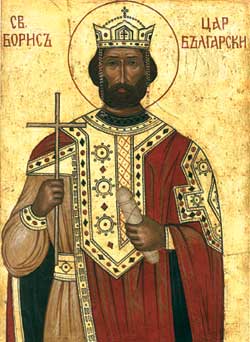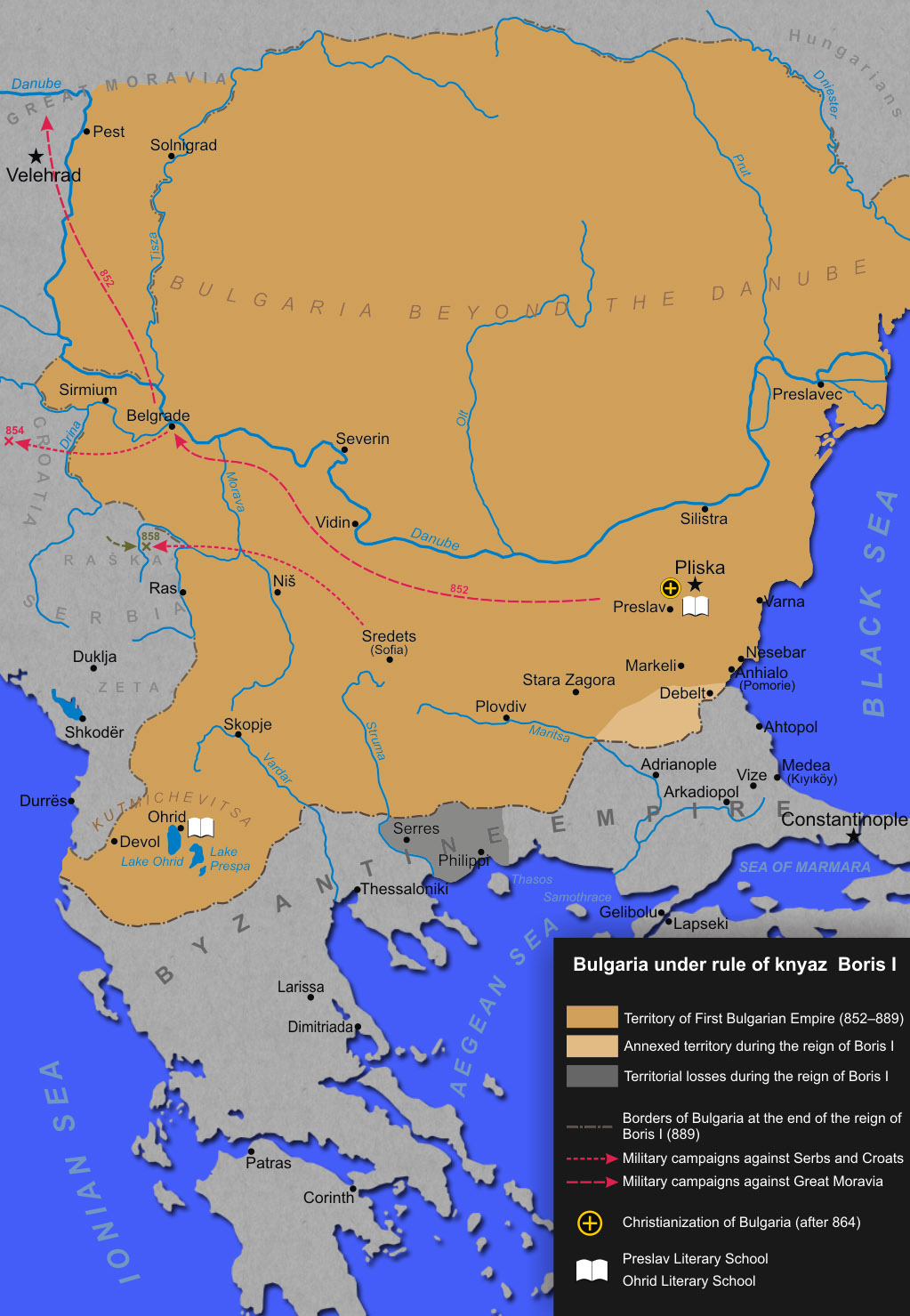
Today on Second of May every year in the Bulgarian Orthodox Church calendar we commemorate the memory of Saint King Boris (Michael) who is a baptizer of Bulgarian nation and among the greatest saint of Bulgaria, perhaps second in saintship after St. John of Rila.
St. King Boris was the ruler of the First bulgarian Empire (852-889) the actual title as we know it from the chronicles is not king but archont which literally means ruler, but as the main chronicles who came to us are Byzantine we have to take in consideration that Byzantine Chronicles aimed to discredit the Bulgarian rulers because of feeling inferior every non-Byzantines who in Byzantine terms were considered barbarians.
He had a notable correspondence with Pope Nicolas II head of the Western Church before the Great Schism.
Saint Boris I is famous with with 115 Questions (which are fully preserved). He beseech the pope to sent an apostoles of faith who will teach the new nation to faith in the same time he lead a correspondence with the Byzantine emperor and the Eastern Church.
The pope sent 2 missionaries cardinal Formiosa of Portuens and Bishop Paul of Papulon. King Boris requested for Cardinal Formiosa to become a future archibishop of Bulgaria, but the pope Nicolas II being afraid of loosing ground of a choice of future Bulgarian archibishop rejected king Boris request it is interesting fact that the same cardinal Formiosa become the next Pope of the Roman Western Church in period (891 – 896).
Taking in consideration the papal's desire to dominate over him and the more freedoms given by the Byzantine Church along with the fact that Saint Cyril and Methodius's pupils came to him with a ready Church Slavonic Glagolic version of the Holy Bible and a new Church language (and considering the fact that the seven pupils of St. Cyril and Methodius were being chased away from Great Moravia (Saint Clement of Ohrid (Kliment Ohridski) and Naum Ohrdiski with Sava, Angelarius and Gorazd) and seeing the fallacy of the filioque addition to the Creed of Faith finally King Boris received baptism by the hands of Patriarch Photius.
He received holy baptismal in year 864, receiving the Christian name Michael (Mihail) receiving his Christian name from his godfather, Emperor Michael III.
According to Church tradition the reason to Baptize in Christian faith was his amazement of an icon of the Judgement Day he saw in one of his visits to Constantinople.
The Church tradition also says saint Boris I's sister have lived for a long time in Constantinople, where she received baptism and once returning to the Bulgaria she bring the light of faith here too.
Besides that some of his family has already earlier converted to Christianity and some earlier Bulgarian Khans such as Trivelius (Tervel) who is considered to saved Europe from Muslim Invasion earlier were already Christians.

During his holy reign he has established mass Christianization of Bulgaria, where the traditional ancient pagan traditions and belief in fake gods like Tangra were abolished completely.
St. Tsar Boris has secured the Bulgarian Church an autocephalousy, he also received the saints Cyril and Methodius, when they were banished from Great Moravia.
Our saint king has secured a refuge for st. Cyril and Methodius and provided them with assistance to develop the Slavonic alphabet and literature.
After he abdicated in 889, his eldest son and successor tried to restore the old pagan religion but was deposed by Boris I. During the Council of Preslav which followed that event, the Byzantine clergy was replaced with Bulgarian and the Greek language was replaced with Old Bulgarian as an official language of the Church and the state.

In 889 Boris abdicated the throne and became a monk. His son and successor Vladimir attempted a pagan reaction (to return the Bulgarians to the old belief in Tanra), which brought Boris out of his monastic life in 893 out of zeal for Christ and a fatherhood for the future of Bulgarian nation.
Vladimir was defeated and blinded by a miracle of God as Boris had less soldiers than his pagan son but in the name of the Lord Jesus Christ he showed victorious.
Once defeating his unbelieving son, Boris gathered the Council of Preslav in which the Old Greek language in Church was replaced with Church Slavonic and most imporantly on the council King Boris on the Church assembly placed his third son, Simeon I of Bulgaria on the throne, threatening him with the same fate if he too apostatized.
Simeon I was reluctant to become a secular ruler as according to some of the written sources he was preparing to become a great spiritual leader a monk and perhaps a next archibishop or even patriarch in the newly established autocephalous Bulgarian Church but following the monk rule of humility he decided and accepted the throne but throughout his life he kept his great zeal for monasticism and enlightenment. His ruling become a golden age for the Church Slavonic he financed seriously and worked hardly to prepare educated monks and to translate a major works of the Holy Fathers such as Shestodnev (The Six Days of Creation), Simeonov Sbornik (Simeon's Collection) and many of the key works of saint Athanasius the Great, Saint Basyl the Great, Saint John of Damascus etc.
According to some historians it was King Simeon who later give birth to the second by size Monastic Community in Byzantine Emperire the Stone Monasteries of (Meteora).
Boris returned to his monastery, emerging once again in c. 895 to help Simeon fight the Magyars, who had invaded Bulgaria in alliance with the Byzantines. After the passing of this crisis, Boris resumed monastic life and led a holy life until he pass out in year 907.
Here is the daily troparion assigned by the Bulgarian Orthodox Church sang at the churches today (the text is translation from Bulgarian):
St. Boris-Michael, prince of Bulgaria, Troparion
Full of the fear of God, and enlightened by holy baptism, thou becamest a habitation of the Holy Spirit,
O right-believing King Boris; and having established the Orthodox Faith in the land of Bulgaria,
and set aside the scepter of kingship,
thou madest thine abode in the wil derness,
didst flourish in ascetic struggles, and found grace before the Lord.
And now, standing before the throne of the Most High, pray thou, that He grant unto us who entreat thee salva tion for our souls.
More helpful Articles

Tags: alliance, baptizer, belief, Bulgarian Church, bulgarian empire, bulgarian orthodox church, byzantines, christianization, church calendar, cyril and methodius, eldest son, emperor michael, event, fate, feast, fight, future, godfather, greek language, John of Rila, King, king boris, magyars, mass, Monastery, monastic life, monk, Moravia, Old, pagan religion, pagan traditions, Preslav, pupils, refuge, religion, retirement, Saint King Boris Michael, saints cyril and methodius, simeon i, st cyril and methodius, successor, text, today, Tsar, tsar boris, year








Mozilla/5.0 (Windows NT 6.1; WOW64; rv:53.0) Gecko/20100101 Firefox/53.0
Boris I, also known as Boris-Mikhail (Michael) and Bogoris (Bulgarian: Борис I / Борис-Михаил; died 2 May 907), was the ruler of the First Bulgarian Empire in 852–889. At the time of his baptism in 864, Boris was named Michael after his godfather, Emperor Michael III. The historian Steven Runciman called him one of the greatest persons in history.[1]
Despite a number of military setbacks, the reign of Boris I was marked with significant events that shaped Bulgarian and European history. With the Christianization of Bulgaria the traditional state religion Tengriism was abolished. A skilful diplomat, Boris I successfully exploited the conflict between the Patriarchate of Constantinople and the Papacy to secure an autocephalous Bulgarian Church, thus dealing with the nobility’s concerns about Byzantine interference in Bulgaria’s internal affairs.
When in 885 the disciples of Saints Cyril and Methodius were banished from Great Moravia, Boris I gave them refuge and provided assistance to develop the Bulgarian alphabet and literature. After he abdicated in 889, his eldest son and successor tried to restore the old pagan religion but was deposed by Boris I. During the Council of Preslav which followed that event, the Byzantine clergy was replaced with Bulgarians, and the Greek language was replaced with what is now known as Old Church Slavonic, which in Bulgaria is called and known as Old Bulgarian, as an official language of the Church and the state.
He is regarded as a saint in the Orthodox Church, as the Prince and baptizer of Bulgaria, and as Equal-to-the-Apostles, with his feast day observed on May 2.[2]
View CommentView Comment